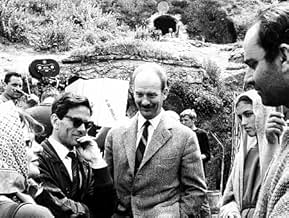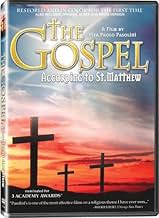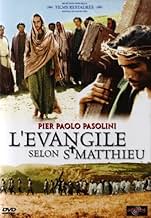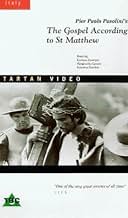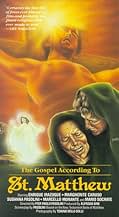La vida de Jesucristo según el Evangelio de Mateo. Pasolini muestra a Cristo como un marxista pionero y, por ello, utiliza solo parte del texto de Mateo.La vida de Jesucristo según el Evangelio de Mateo. Pasolini muestra a Cristo como un marxista pionero y, por ello, utiliza solo parte del texto de Mateo.La vida de Jesucristo según el Evangelio de Mateo. Pasolini muestra a Cristo como un marxista pionero y, por ello, utiliza solo parte del texto de Mateo.
- Dirección
- Guionista
- Elenco
- Nominado a 3 premios Óscar
- 7 premios ganados y 9 nominaciones en total
- Caifa
- (as Rodolfo Wilcock)
- Dirección
- Guionista
- Todo el elenco y el equipo
- Producción, taquilla y más en IMDbPro
Opiniones destacadas
This is such a stately, respectful, yet contemporary (and dare I say, Italian) production, in quiet black and white, it's hard to find fault with it. In some ways, I think it does exactly what it intends. It mixes long shots with close ups. It moves with clarity and sharp (no dissolve) cuts from face to face. It uses African-American gospel and Bach. It depends on solemnity, and it uses actors that have the faces, and demeanors, to be utterly solemn and strong.
All the actors are amateurs. Pasolini was an atheist. The triumph at the end is a matter of record. It's all here.
The question might be (for some) whether it is nevertheless a movie you want to watch. And I say, absolutely. You do have to like, or learn to like, movies that are about quiet ambiance, about passive expressions that say more than intense extroverted acting. The black and white photography, something of a throwback during this early 1960s production, gives it even more of the timeless, almost melancholy depth that keeps it going, owing something to the Dreyer's Joan of Arc, I think.
It's important to know this is not really an interpretation of the gospel, but a reading of it. The filming of course required actors, but it tries to be factually straight forward. That's incredibly hard to pull off without arrogance or religiosity. But Pasolini does it. The down side to this is that it's slow, or even (no sacrilege here), boring. I mean, I read the book.
For me, what makes it terrific is not only how it is filmed (the camera-work and editing) and the faces (all those faces, with the camera still and focused on them), but the sense of reality here. The holiness is removed, but not the sacred seriousness. It makes it seem possible in a very real way. The people, the places, all of it is not historic, not in particular, but the effect, the mood, the force of it all is profound. Even for a non-believer. It's quite something to get swept into.
Jesus and his 12 followers are a group of involved young men, who champion for revolutionary concerns. The youth and inexperience of the actors gives a fascinating sense of the fragility of the Christian movement itself in its very beginnings. The iconic-like closeups are a reminiscent of medieval, religious pictures whereas Enrique Irazoqui, who plays Jesus, seems like as if he descended right from a El Greco painting with his thin figure and slim, long face. The music from Bach and Mozart, as well as Blues recordings conveys additional meaning: The cry of revolt and the demand to be heard and received by the people and its authorities. It becomes utterly touching when the film dissolves into melancholy and passion by the power of Bach's classical music chorus and the blues.
The cinematography is remarkable and takes in many scenes the position of a third person telling the story. The intensely textual and dramaturgic reference to the biblical model, the amateurish performances of the actors and the waive of any pathos gives the film a strong naturalistic nuance. Jesus is less the son of god, but more an ideological fighter who gives radical speeches. But, Pasolini does not demystify the figure of Christ, nor does he question the set dogmas of the official church. He rather accentuates the social facets of Jesus' life and work and gives it an unforeseen political smack
Enrique Irazoqui, who plays Jesus, gives an excellent performance. He brings an intensity and harshness to the role that is very much in accord with the Jesus portrayed in numerous passages of the gospels. Margherita Caruso, who plays Mary as a young women, is an inspired choice. Although she does very little, and I cannot truly commend her for her acting, she has an amazing presence in this film, combining serenity, holiness, and innocence.
Pasolini paces the film well. It never drags, and never passes over subjects or incidents too quickly. The heroic quality of Jesus' life is strongly emphasized, his confrontations with existing religious authorities, his preaching of his message throughout Palestine, his bravery before the Roman authorities, and so on. Through demonstrations of his resolve, composure, and sternness, a real sense of the courage and dynamism of the character of Jesus is produced.
Pasolini's choices of locations could not have been better, and the scenes are staged and filmed skillfully, emphasizing the right emotions at the right times, whether those are feelings of sympathy, courage, or awe. I would not go so far as to say that any of these elements demonstrate brilliance, but they are very well done.
I was impressed with Pasolini's use of the gospels, which provide the bulk of what the character of Jesus actually says. I might note, also, that the harshness of much of the message is left intact. Conservative Christians might find this appealing, in that the director does not sanitize the message. Certainly, the pope enjoyed it. Pasolini received a medal from him. Non-Christians, and more liberal Christians, might find parts of the message to be a little frightening. When some of the harsher elements, especially the religious exclusivism (i.e., only those who believe in Christ have hope) are heard as spoken dialogue, rather than as words printed on a page, their impact is much greater, whether it is more disturbing or more inspiring. The film is a powerful evocation of the life of an important religious figure, and can be enjoyed by both believers and non-believers.
The film does have it's faults, however. The scene in which the "massacre of the innocents" is shown is poorly done. I personally found the depiction of the event to be somewhat comical, which clearly was not Pasolini's intention. The score, which draws on a variety of genres of Christian religious music is, by itself, beautiful. Unfortunately, I felt that it did not complement the film. The juxtaposition of disparate musical traditions with one another, and with the harsh world being visually depicted weakened the effect of both, had either stood on its own. I should say that these are relatively minor complaints. The film as a whole is a moving and impressive work. I do not think that it is as impressive a work as any of Pasolini's "Trilogy of Life" films, but it is a great film nonetheless.
¿Sabías que…?
- TriviaPier Paolo Pasolini used non-professional actors and cast local peasants, shopkeepers, factory workers, and truck drivers. For Mary at the time of the Crucifixion, he cast his own mother Susanna Pasolini.
- ErroresWhen they are taking Christ down from the cross, in the distance you can see a car driving around a corner.
- Citas
[last lines]
Christ: All authority has been given to me in heaven and earth. Go, therefore. And make disciples of all nations, baptizing them in the name of the Father, and of the Son and the Holy Ghost, teaching them to observe everything I have commanded you. And behold. I am with you always even unto the end of the world.
- Versiones alternativasThe 2007 DVD release features a colorized, English-dubbed version with a run time of 91 minutes and an Italian-language black and white version running 136 minutes.
- ConexionesEdited into Histoire(s) du cinéma: Une histoire seule (1989)
- Bandas sonorasMatthäus Passion (BWV 244)
Written by Johann Sebastian Bach
nr 78: Wir setzen uns mit Tränen nieder
nr 47: Erbarme Dich (musical intro)
Selecciones populares
- How long is The Gospel According to St. Matthew?Con tecnología de Alexa
Detalles
- Fecha de lanzamiento
- Países de origen
- Idioma
- También se conoce como
- El Evangelio según Mateo
- Locaciones de filmación
- Castel Lagopesole, Avigliano, Basilicata, Italia(Sanhedrin trial of Jesus, in castle's courtyard)
- Productoras
- Ver más créditos de la compañía en IMDbPro
Taquilla
- Total a nivel mundial
- USD 16,572
- Tiempo de ejecución2 horas 17 minutos
- Color
- Mezcla de sonido
- Relación de aspecto
- 1.85 : 1
Contribuir a esta página



